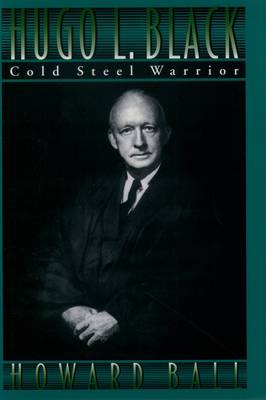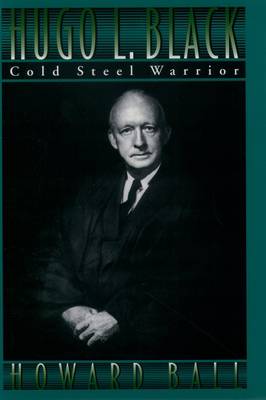
- Retrait gratuit dans votre magasin Club
- 7.000.000 titres dans notre catalogue
- Payer en toute sécurité
- Toujours un magasin près de chez vous
- Retrait gratuit dans votre magasin Club
- 7.000.0000 titres dans notre catalogue
- Payer en toute sécurité
- Toujours un magasin près de chez vous
Description
During his thirty-four year tenure as a Justice of the Supreme Court, Hugo L. Black demonstrated, in the words of one of his colleagues, "a true passion for the Constitution." At a moment's notice, in front of visiting students or a clutch of legal dignitaries, the Judge would whip his tattered copy of the Constitution from his coat pocket, flip through it to a particular passage and then, in a high voice, read the passage con vivace. And though Black began his political career in Alabama as the candidate of the Ku Klux Klan--with their help in 1926 he became a U.S. Senator--thirty years later, he would argue forcefully for an end to segregation in the South.
In Hugo L. Black: Cold Steel Warrior, distinguished writer Howard Ball draws from Black's extensive files in the Library of Congress and on interviews with his colleagues on the Court, his law clerks, and his family to illuminate the enigmatic career of a man who became one of the twentieth century's most vigilant defenders of freedoms and liberty. Ball's examination of Black's life reveals a consummate politician who kept, in a safe beside his desk, the names, addresses, and backgrounds of all those who gave Black support from the time he ran for the county solicitor's job in Jefferson County, Alabama, through his two terms as a U.S. Senator. A fervent New Deal advocate, Black lent his support to F.D.R.'s court packing plan, and was one of the few who stood with the President until the measure's defeat in 1937. Less than one month later, F.D.R. rewarded Black by nominating him to the Supreme Court. Soon after Black's confirmation by the Senate, the story of his Klan membership spread across the nation, prompting Time magazine to write that "Hugo won't have to buy a robe, he can dye his white one black." One of Black's early opinions for the Court, however, changed most of the negative opinion about him. Writing for the majority in Chambers v. Florida, Black and his colleagues overturned charges against four African-American men unjustly accused of murder.
In addition to Black's political and judicial career, Ball captures some of the great legal minds at work--Earl Warren, Thurgood Marshall, Felix Frankfurter, William O. Douglas, John M. Harlan II, and William J. Brennan--and their encounters with the tough Justice who was an immovable force when engaged in a constitutional battle. From Brown v. Board of Education and the first tests of the power of the federal courts to implement the Brown decision, to the height of McCarthyism and the national hysteria about Communism, to New York Times v. United States, the famous Pentagon Papers case in 1971 (Black's last opinion for the Court which defended a newspaper's First Amendment rights), Black emerges as a staunch defender of federalism and the primacy of the First Amendment, a strict, literal interpreter of the Constitution, and always proud to be a member of the Supreme Court.
Throughout his life, Hugo Black's cockiness, sternness, and stubborn determination won him many critics. On every occasion, as Howard Ball shows, Black proved his critics wrong. He became a major presence in the Senate and one of the great Justices ever to sit on the Supreme Court.
In Hugo L. Black: Cold Steel Warrior, distinguished writer Howard Ball draws from Black's extensive files in the Library of Congress and on interviews with his colleagues on the Court, his law clerks, and his family to illuminate the enigmatic career of a man who became one of the twentieth century's most vigilant defenders of freedoms and liberty. Ball's examination of Black's life reveals a consummate politician who kept, in a safe beside his desk, the names, addresses, and backgrounds of all those who gave Black support from the time he ran for the county solicitor's job in Jefferson County, Alabama, through his two terms as a U.S. Senator. A fervent New Deal advocate, Black lent his support to F.D.R.'s court packing plan, and was one of the few who stood with the President until the measure's defeat in 1937. Less than one month later, F.D.R. rewarded Black by nominating him to the Supreme Court. Soon after Black's confirmation by the Senate, the story of his Klan membership spread across the nation, prompting Time magazine to write that "Hugo won't have to buy a robe, he can dye his white one black." One of Black's early opinions for the Court, however, changed most of the negative opinion about him. Writing for the majority in Chambers v. Florida, Black and his colleagues overturned charges against four African-American men unjustly accused of murder.
In addition to Black's political and judicial career, Ball captures some of the great legal minds at work--Earl Warren, Thurgood Marshall, Felix Frankfurter, William O. Douglas, John M. Harlan II, and William J. Brennan--and their encounters with the tough Justice who was an immovable force when engaged in a constitutional battle. From Brown v. Board of Education and the first tests of the power of the federal courts to implement the Brown decision, to the height of McCarthyism and the national hysteria about Communism, to New York Times v. United States, the famous Pentagon Papers case in 1971 (Black's last opinion for the Court which defended a newspaper's First Amendment rights), Black emerges as a staunch defender of federalism and the primacy of the First Amendment, a strict, literal interpreter of the Constitution, and always proud to be a member of the Supreme Court.
Throughout his life, Hugo Black's cockiness, sternness, and stubborn determination won him many critics. On every occasion, as Howard Ball shows, Black proved his critics wrong. He became a major presence in the Senate and one of the great Justices ever to sit on the Supreme Court.
Spécifications
Parties prenantes
- Auteur(s) :
- Editeur:
Contenu
- Nombre de pages :
- 328
- Langue:
- Anglais
Caractéristiques
- EAN:
- 9780195078145
- Date de parution :
- 12-09-96
- Format:
- Livre relié
- Format numérique:
- Genaaid
- Dimensions :
- 163 mm x 237 mm
- Poids :
- 630 g

Les avis
Nous publions uniquement les avis qui respectent les conditions requises. Consultez nos conditions pour les avis.






